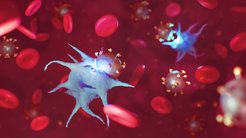Fighting tumours faster and more effectively with your own immune syste
Development of a new mechanism for functionalizing nanocapsule
It is a new approach to fighting tumours: teaching the human immune system to fight tumours on its own. To do this, it is important to specifically address cells of the immune system and train them. However, the process of targeting these cells has so far been lengthy and expensive. Researchers at the Max Planck Institute for Polymer Research have therefore developed a new process to simplify the application of a kind of “address label” to drug carriers. This could simplify the process of training in the future and make tumor therapy more effective.

Tumors are true artists in hiding: they can grow in the body unnoticed by the immune system until they are discovered at some point during an examination. A new approach is to specifically train the immune system so that even the smallest tumors are detected and destroyed.
An important component of the immune system here are dendritic cells - a kind of "mini database" that controls the immune defense. If tumor characteristics can be “entered” into this database, the immune system can react. The technology required for this is being continuously refined on a laboratory scale: so-called “nanocarriers” receive genetic material from the tumor, which they deliver to the dendritic cells.
The special feature here is that the surface of the nanocarriers is coated with antibodies in such a way that they can dock specifically to dendritic cells using a kind of “lock-and-key mechanism” - in other words, they are given a kind of address label. This makes it possible to significantly reduce the dose of nanocarriers and thus keep side effects comparatively low.
However, this method has a disadvantage: the binding of such antibodies to nanocarriers is time-consuming and expensive - because this requires a modification of the antibody that binds it in the correct orientation. This is the only way to prevent uptake into cells other than the desired dendritic cells.
Researchers at the Max Planck Institute for Polymer Research have now developed a new method in which so-called “nanobodies” are used instead of antibodies. These consist exclusively of the region of the antibody that is responsible for binding to the cell. The rest of the antibody, which previously required lengthy modification, is no longer needed. In addition, unlike the antibodies, the nanobodies already contain a terminal sulphur-containing cysteine group, which is necessary for binding to the nanoparticle. This simplifies functionalization and reduces the synthesis time from several days to a few hours.
"With our method of coupling nanobodies to vaccine particles, we were able to reduce the production time from several days to just a few hours. We expect that our work will enable the immune system to be trained more quickly and effectively against tumors," says Volker Mailänder, professor at Mainz University Medical Center and group leader at the MPI for Polymer Research in Katharina Landfester's department
The researchers hope that the increased effectiveness and reduced costs of production can accelerate the development of a nano-based tumor therapy. However, it is likely to be several years before it can be used on humans.












